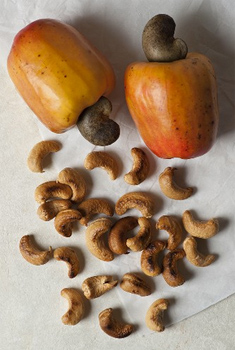 |
|
 |
|
Cashew nut nutrition facts Delicately sweet yet crunchy and delicious cashew nut is packed with energy, antioxidants, minerals and vitamins that are essential for robust health! Cashew, or “caju” in Portuguese, is one of the popular ingredients in sweet as well savory dishes worldwide.
Botanically, cashew is an average size tropical evergreen tree belonging within the Anacardiaceae family of the genus: Anacardium. Scientific name: Anacardium occidentale.
 The cashew tree is native to Brazil’s Amazon rain forest, which spread all over the world by Portuguese explorers. Today, it is cultivated commercially in Brazil, Vietnam, and India and in many African countries.
Cashew tree bears numerous, edible, pear shaped false fruits or “accessory fruits'” called "cashew apples." A small bean shaped, grey color “true-fruit” is firmly adhering to lower end of these cashew-apples appearing like a clapper in the bell. Botanically, this “true fruit” is a drupe, featuring hard outer shell enclosing a single edible seed or the “cashew nut.” The exterior shell composes a phenolic resin, urushiol, which is a potent caustic skin irritant toxin. In the processing units, this outer shell is roasted in order to destroy the urushiol resin, and then; the edible cashew kernel is extracted.
Cashew nut measures about an inch in length and 1/2 inches in diameter with kidney or bean shape, and smooth curvy pointed tip. Each nut has two equal halves as in legumes. The nuts are cream white color with the firm yet delicate texture and smooth surface. Cashews have buttery texture with a pleasant sweet fruity aroma.
Health benefits of Cashew nuts
Cashews are high in calories. 100 g of nuts provide 553 calories. They are packed with soluble dietary fiber, vitamins, minerals and numerous health-promoting phyto-chemicals that help protect from diseases and cancers.
They are rich in “heart-friendly” monounsaturated-fatty acids like oleic, and palmitoleic acids. These essential fatty acids help lower harmful LDL-cholesterol while increasing good HDL cholesterol. Research studies suggest that Mediterranean diet, which is rich in monounsaturated fatty acids help to prevent coronary artery disease and strokes by favoring healthy blood lipid profile.
Cashew nuts are very rich source of essential minerals. Minerals, especially manganese, potassium, copper, iron, magnesium, zinc and selenium are concentrated in these nuts. A handful of cashew nuts a day in the diet would provide enough of these minerals and prevent deficiency diseases. Selenium is an important micronutrient, which functions as a co-factor for antioxidant enzymes such as Glutathione peroxidases, one of the most powerful antioxidants in the body. Copper is a cofactor for many vital enzymes, including cytochrome c-oxidase and superoxide dismutase (other minerals function as co-factors for this enzyme are manganese and zinc). Zinc is a co-factor in many enzymes that regulate growth and development, sperm generation, digestion and nucleic acid synthesis.
Cashews are also rich in many essential vitamins such as pantothenic acid (vitamin B5), pyridoxine (vitamin B-6), riboflavin, and thiamin (vitamin B-1). 100 g nuts provide 0.147 mg or 32% of daily-recommended levels of pyridoxine. Pyridoxine reduces the risk of homocystinuria, and sideroblastic anemia. Niacin helps prevent "pellagra" or dermatitis. Additionally, these vitamins are essential for metabolism of protein, fat, and carbohydrates at cellular levels.
Further, the nuts are also containing a small amount of zea-xanthin, an important pigment flavonoid antioxidant, which selectively absorbed into the retinal macula lutea in the eyes. It is thought to provide antioxidant and protective UV ray filtering functions and helps prevent age-related macular degeneration (ARMD) in the elderly.
Selection and storage
Cashew nuts are available in the market year round. In the stores, only shelled cashew kernels are sold since the shell contains phenolic resin, urushiol, which is a potent skin irritant toxin.
Different forms of cashews are available; raw, salted, sweetened or ground...etc. Buy shelled nuts that are bright cream-white in color, compact, uniform in size and feel heavy in hand. They should be free from cracks, mold, and spots and free of rancid smell.
Store shelled nuts inside an airtight container and keep in the refrigerator in order to avoid them turn rancid. Under ideal conditions, fresh nuts should last for 5-6 months.
Safety profile
Cashew nut allergy is a common hypersensitivity condition in some individuals, especially in children. The reaction symptoms may range from simple skin itching (hives) to severe form anaphylactic manifestations, including breathing difficulty, pain abdomen, vomiting, and diarrhea.
The allergic manifestations are due to chemical compound anacardic acid (urushiol) that is present in cashew apples, shells, and nuts. Cross-reactions also occur with some other nuts and fruits of Anacardiaceae family such as mango, pistachio, etc.
Individuals with known allergic reactions to cashew nut and fruit may observe caution while eating them. (Medical disclaimer). See Also Health Benefits of Watermelon Seeds, 8 ways to a healthy blood pressure, ways to control high blood pressure without medication, ARJUNA A HEART SAVING TREE, Flax seed nutrition facts, Cashew nut nutrition facts, Health Benefits of Brown Rice, Aloe Vera Juice The New Miracle Drink, Super Health Benefits of Sesame Seeds, Home Remedies for High Blood Pressure, 10 ways to control high blood pressure without medication, Almonds nutrition facts, Health benefits of Walnuts, Health benefits of black pepper, Surprising Health Benefits of Cinnamon, Explore the health benefits of garlic, Health Benefits of Drinking Green Tea, Amazing Health Benefits of ginger, Health Benefits of Turmeric, Best Fruits for Losing Weight, Eating Regularly To Lose Weight, Benefits of Clove in our day to day life, Health Benefits of Neem, Benefits of the Holy Basil (Tulsi), Health Benefit of red Chillies, Healthy Diet Habits, The healthiest way to lose weight , 10 Benefits to Drinking Warm Lemon Water Every Morning, Health Benefits of Apricot, Benefits of Honey in Weight Loss, Health Benefits of Indian Gooseberry or Amla, |
|
|
|
|
|
|
|
All Rights Reserved. Indyabiz.com







